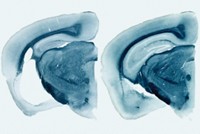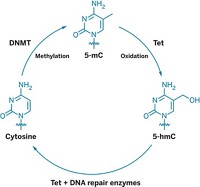Advertisement
Grab your lab coat. Let's get started
Welcome!
Welcome!
Create an account below to get 6 C&EN articles per month, receive newsletters and more - all free.
It seems this is your first time logging in online. Please enter the following information to continue.
As an ACS member you automatically get access to this site. All we need is few more details to create your reading experience.
Not you? Sign in with a different account.
Not you? Sign in with a different account.
ERROR 1
ERROR 1
ERROR 2
ERROR 2
ERROR 2
ERROR 2
ERROR 2
Password and Confirm password must match.
If you have an ACS member number, please enter it here so we can link this account to your membership. (optional)
ERROR 2
ACS values your privacy. By submitting your information, you are gaining access to C&EN and subscribing to our weekly newsletter. We use the information you provide to make your reading experience better, and we will never sell your data to third party members.
Biological Chemistry
DNA methylation may help form memories
March 19, 2007
| A version of this story appeared in
Volume 85, Issue 12
Once cells in an embryo have differentiated sufficiently, DNA methyltransferase (DNMT) attaches methyl groups to select regions of DNA to permanently switch off targeted genes. Researchers at the University of Alabama, Birmingham, propose that brain cells have adapted this technique as a means to store memories (Neuron 2007, 53, 857). Neurobiologists Courtney A. Miller and J. David Sweatt began a study by conditioning rats with a series of mild shocks in a training chamber. The researchers found that blocking DNMT activity interfered with the animals' ability to form memories of fear associated with the chamber. Conversely, formation of fear-related memories in conditioned but otherwise untreated animals increased production of DNMT messenger RNA. Fear conditioning also increased methylation, and hence deactivation, of a memory-suppressor gene and demethylation, and hence activation, of a memory-promoting gene. These modifications were all rapid and reversible, the researchers say, which suggests that "changes in DNA methylation in the adult nervous system are not necessarily permanent."





Join the conversation
Contact the reporter
Submit a Letter to the Editor for publication
Engage with us on Twitter